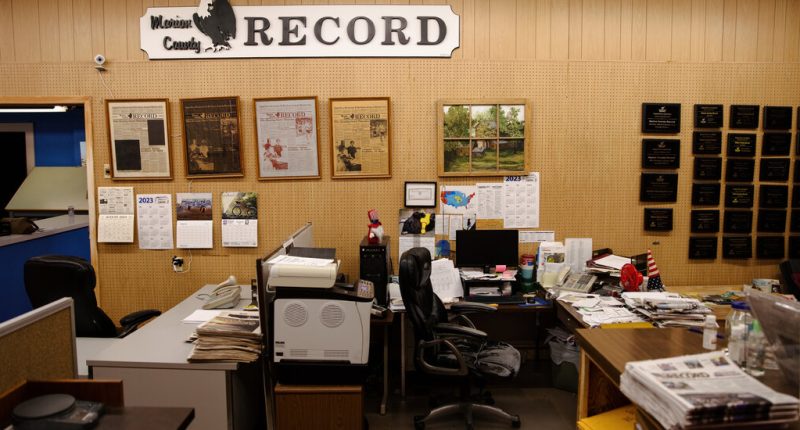
A lawyer for The Marion County Record, a Kansas newspaper that was raided by the police late last week, demanded that the town’s Police Department not review any information on the devices it seized until a court hearing could be scheduled.
The lawyer, Bernard J. Rhodes, said in a letter to Marion’s police chief, Gideon Cody, that he was offering the department “an opportunity to mitigate my client’s damages from the illegal searches.”
On Friday, the police and county sheriff’s deputies raided the newspaper’s office, the home of its owner and editor, and the home of a city councilwoman. They collected computers, cellphones and other materials. The searches were part of investigation into how a document containing information about a local restaurateur found its way to and was handled by The Record — and whether the restaurant owner’s privacy was violated in the process.
A search warrant issued by a judge on Friday morning cited potential violations of laws involving identity theft and the illegal use of a computer.
Search and seizure of the tools to produce journalism are rare, and the editor of the paper, Eric Meyer, said that the newspaper did nothing wrong. First Amendment experts, press freedom advocates and dozens of news organizations have condemned the raid. The Society of Professional Journalists said on Monday that it would cover up to $20,000 in legal fees for The Marion County Record.
Mr. Rhodes said in the letter to the police chief that the devices seized contained information from and the identities of confidential sources, which was protected by federal and state laws. Mr. Rhodes demanded that the department not review information on the devices until a court hearing was scheduled.
“Your personal decision to treat the local newspaper as a drug cartel or a street gang offends the constitutional protections the founding fathers gave the free press,” Mr. Rhodes wrote in the letter, which was viewed by The New York Times.
Mr. Rhodes also said the newspaper’s use of the Kansas Department of Revenue’s website to verify a drunken-driving citation for the local restaurateur was research and was allowed under the Driver’s Privacy Protection Act. The newspaper did not publish an article on the citation.
“I can assure you that The Record will take every step to obtain relief for the damages your heavy-handed actions have already caused my client,” Mr. Rhodes wrote.
The letter was sent to Marion’s chief of police on Sunday and the Kansas Bureau of Investigation, which aids criminal justice agencies statewide, on Monday. Mr. Rhodes said he had not gotten a response from either office.
The Marion Police Department and Kansas Bureau of Investigation did not immediately respond to requests for comment from The Times.
Mr. Meyer, 69, an owner and the editor of The Marion County Record, said in an email on Monday that his next step was “to publish this week’s paper.”
“Right now, we can’t afford to look much beyond that as we are HORRIBLY behind and will probably need to pull an all-nighter tonight,” he said. “Any steps beyond that are up to our attorney.”
Mr. Meyer’s 98-year-old mother, a co-owner of the paper with whom he has lived since returning to the town in recent years, died on Saturday, the day after the raid.
Source: | This article originally belongs to Nytimes.com









